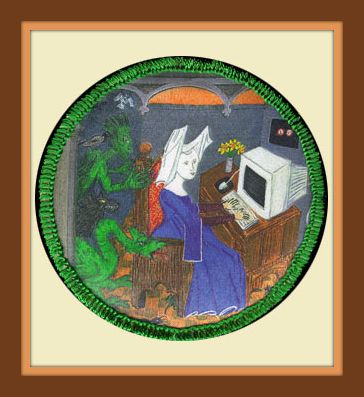
We are getting ready for our session to decide all our reading selections for 2008 book group. I love hearing about books and talking about lots of books and am looking forward to it. (And of course, I want to have a great list of books to read and discuss for next year.)
I've been thinking about what I would suggest for a while and have gone through multiple ideas in my head. Some fiction written in the last 10 years that I really like with interesting things to discuss (The Sparrow, Peace Like a River A Thousand Splendid Suns) and a memoir by Madeleine L'Engle about her marriage (Two Part Invention)--I thought it would be a nice look back at her life given her recent death. Even reading some of her YA fiction would have been fun. I also went through quite a few other titles, trying to read through them a little bit and find something that would be good for book group.
But, I ultimately decided to suggest books in areas where I felt I could make a "me" contribution, that would be a little different than what others might suggest. Two of my choices are in areas where I have done some reading and have a strong interest--Mormon studies and feminism/women's studies. Of course, I won't label them that way when I talk about them since that would almost certainly signal their death knell. I hope that my ideas don't die in flames. We'll see what the group thinks. And then one of my selections is a play. I really don't know anything about drama, but it seemed like a good and different kind of choice.
Here's what I just emailed my group about my choices:
1. Well Behaved Women Seldom Make History: I started thinking about this book as a possibility for our group when Christina mentioned Susan B Anthony. This is a new book by a women named Laurel Thatcher Ulrich who is a historian at Harvard and a member of the church. (This book has really nothing to do with the church, but I find Ulrich's personal story fascinating as a women who married and had children, and then went back to grad school in her 20's and 30's, taking a long time to finish, and then has become a very successful historian.)
The title of her book comes from her first published article when she was a grad student--some obscure journal. The phrase popped into cultural consciousness when some author picked it up for a book epigraph, and now it's found on bumper stickers, t-shirts, etc. Ulrich explores various women throughout history who have broken social conventions and made history in the process. (One of the women she discusses is Elizabeth Cady Stanton, an early suffragist and friend of Susan B. Anthony.)
This isn't an academic book, and I think there would be a lot of great things to talk about.
2. David O. McKay and the Rise of Modern Mormonism: This is a biography of David O. McKay published in 2005, but it is as much about how the church was transformed from a culturally insular Utah institution, with long white bearded prophets, to the global church that we now know.
The story behind how the book came to be is fascinating, and I will tell you more about that when we meet in December, but suffice it to say, the source material for this book is such that the curtain around the first presidency is pulled back a bit, and we can begin to see a little more the day to day workings of a prophet and the men (yes, mostly men, although there is an amazing woman who deserves her own biography) who work with him.
This book is very readable and is full of stories of the big personalities in the church during Pres McKay's tenure, included Ezra T. Benson, Bruce R. McConkie, and Ernest Wilkinson.
Very interesting, lots to talk about.
3. Wit--this is a short Pulitzer prize play written in the last 10 years by Margaret Edson. It is about a English professor who specializes in the poetry of John Donne who is very sick with ovarian cancer. The majority of the play takes place in her hospital room.
Here's a description from AmazonMargaret Edson's powerfully imagined Pulitzer Prize–winning play examines what makes life worth living through her exploration of one of existence's unifying experiences—mortality—while she also probes the vital importance of human relationships. What we as her audience take away from this remarkable drama is a keener sense that, while death is real and unavoidable, our lives are ours to cherish or throw away—a lesson that can be both uplifting and redemptive. As the playwright herself puts it, "The play is not about doctors or even about cancer. It's about kindness, but it shows arrogance. It's about compassion, but it shows insensitivity."
In Wit, Edson delves into timeless questions with no final answers: How should we live our lives knowing that we will die? Is the way we live our lives and interact with others more important than what we achieve materially, professionally, or intellectually? How does language figure into our lives? Can science and art help us conquer death, or our fear of it? What will seem most important to each of us about life as that life comes to an end?
Again, lots to talk about. And HBO has made a film of Wit, which retains most of the qualities of a play. Emma Thompson stars. Excellently done.
I have read probably the first 75 pages of Ulrich's book and I love it so far. Really a lot to think about in the intersection of women and history. I was so inspired by Ulrich's preface--which is somewhat of a personal essay--that I ordered her book A Midwife's Tale which won a Pulitzer and several other prestigious history awards. And then after reading her first chapter, I put material by and about Virginia Woolf and Elizabeth Cady Stanton on my Amazon wish list. And I also ordered a copy of this book to have. I'll write more about it when I finish it.
I've been thinking about the David O. McKay book for a long time. In fact, I suggested it for my Pittsburgh group, and then moved before they did it. I think it would be a great choice, and it's not dense. Lots to think and talk about.
I almost suggested Ibsen's A Doll's House and Hedda Gabbler for my third choice. I just read A Doll's House to review it and see what I thought. It was an interesting play, but there were some things I didn't like about it. It had a similar theme to The Awakening which we did this year , but I thought that the story did not develop nearly as well here as Chopin's. The ending was abrupt. I would like to see it performed, because I did like it. But, I just thought maybe something different would be better. So, I went with Wit, another play with interesting ideas.

1 comment:
yeah, don't use the word "feminism" because then I'll have to vote against that one. ;-)
Post a Comment